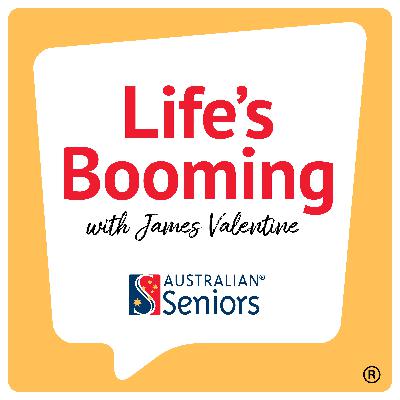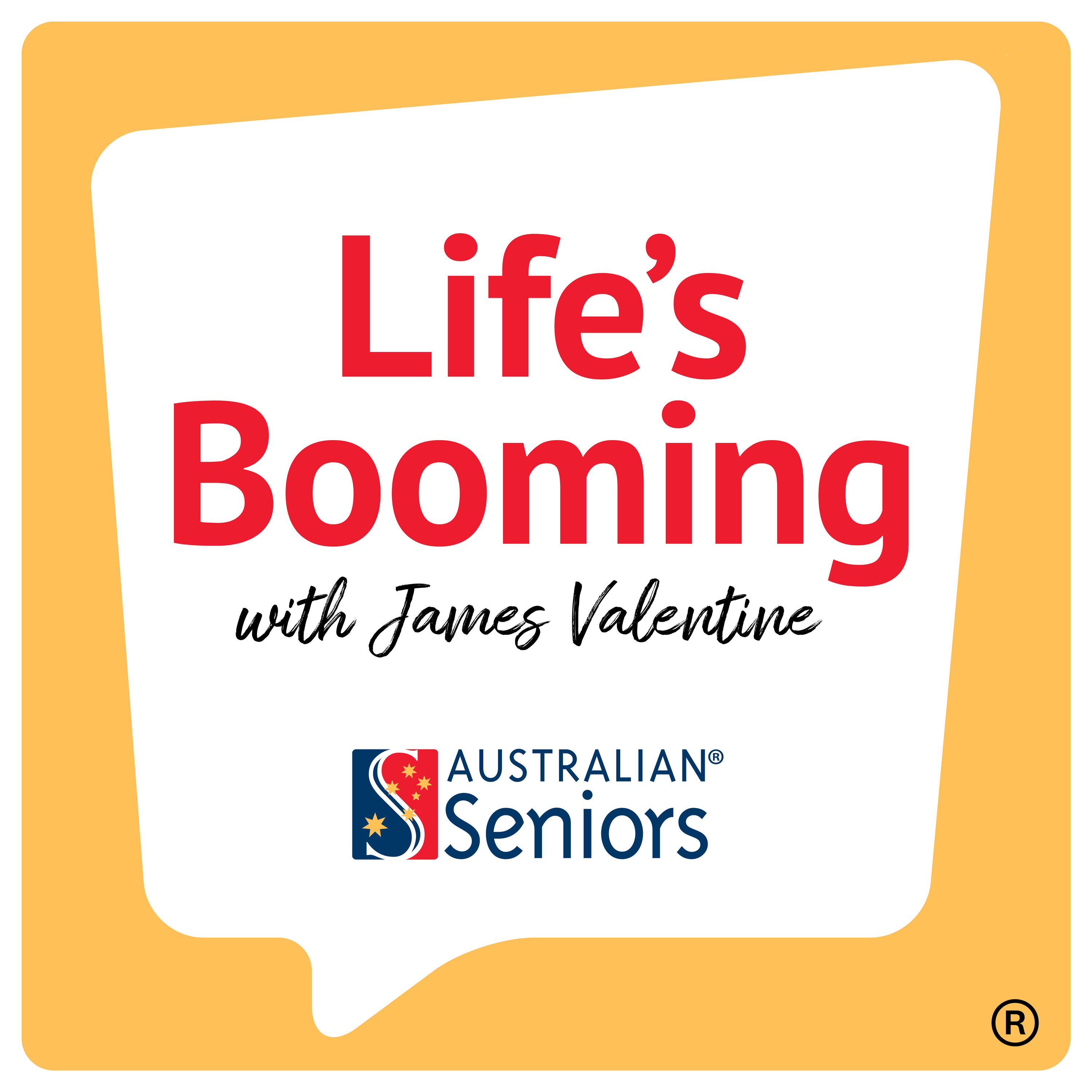Matters of life and death - Dr Annetta Mallon & Martin Tobin
Description
Matters of life and death
Australia’s death care and funeral industry is big business. We meet death doula Dr Annetta Mallon and funeral industry adviser Martin Tobin, two caring and passionate business owners supporting you and your loved ones through the last step on life’s journey.
About the episode – brought to you by Australian Seniors.
Join James Valentine for the sixth season of Life’s Booming: Dying to Know, our most unflinching yet. We’ll have the conversations that are hardest to have, ask the questions that are easy to ignore, and hear stories that will make you think differently about the one thing we’re all guaranteed to experience: Death.
Featuring interviews with famous faces as well as experts in the space, we uncover what they know about what we can expect. There are hard truths, surprising discoveries, tears and even laughs. Nothing about death is off the table.
Dr Annetta Mallon is an end-of-life consultant, doula and educator and grief psychotherapist based in Tasmania. With decades of experience in trauma recovery and personal growth, Annetta helps people understand their rights and options at the end of life – especially those without a strong support network.
Martin Tobin is a recognised family name in the funeral business. He is founder of Funeral Direction, a consultancy supporting funeral homes and cemeteries across Australia and New Zealand. A former solicitor, Martin brings legal, strategic and business insight, and is focused on helping the industry evolve through innovation, education and long-term planning.
If you have any thoughts or questions and want to share your story to Life’s Booming, send us a voice note – lifesbooming@seniors.com.au
Watch Life’s Booming on YouTube
Listen to Life's Booming on Apple Podcasts
Listen to Life's Booming on Spotify
For more information visit seniors.com.au/podcast
Produced by Medium Rare Content Agency, in conjunction with Ampel at Myrtle & Pine Studios
--
Disclaimer: Please be advised that this episode contains discussions about death, which may be triggering or upsetting for some listeners. Listener discretion is advised.
If you are struggling with the loss of a loved one, please know that you are not alone and there are resources available. For additional support please contact Lifeline on 131 114 or Beyond Blue on 1300 224 636.
TRANSCRIPT:
S06EP03_Matters of Life and Death
James: Hello, and welcome to Life's Booming. I'm James Valentine, and this season, we're talking about death.
In this episode, we're talking about matters of life and death, well, the final matter, how we say goodbye. Death is big business, and Australia's death care and funeral industry is worth more than $2 billion.
And with us are two entrepreneurs, two people who work in this area, supporting you and your loved ones through the last step on life’s journey. We're joined by Dr. Annetta Mallon, an end of life consultant, an educator, and also known as a death doula. And Martin Tobin is a recognised family name in the funeral business and is now an expert adviser on the global funeral industry.
Annetta, Martin, welcome to Life's Booming.
So many places to start. I'm excited. And Martin, I'll start with you. What's it like when the family business is death?
Martin: Yeah, well, it's all I've ever known. When I was, you know, when I was born and grew up, I, we actually lived in a funeral parlour. Um, so when I was, for the first two or three years of my life, uh, the funeral parlour was downstairs. We lived upstairs.
So when it's all you've known, you don't think anything different of it. And I suppose all of my friends and sort of social groups when I was young and a teenager thought it was pretty quirky and funny, but for me, it was what I knew. My grandfather and his brother started our family business in the thirties. And by the time I came along, it was well, well and truly established.
I didn't really work directly in it straight away after leaving school, but it was always in the background. And so I've always been comfortable with it.
James: Yeah. But such an interesting thing. Like what's, what's the dinner time conversation.
Did you have a good day, darling? Good deaths? Some good deaths?
Martin: Well, all of that. You know, I think that's the stereotype, isn't it, that funeral directors are a bit, sort of weird and severe and a bit morbid, but, but it's, it's far from the truth. You know, I think most people who work in funeral service, and the work that Annetta does, are really warm and loving and gregarious people because you have to have those qualities to really survive and thrive in, in what we do in that space.
James: You kind of got to love life, Annetta.
Annetta: Absolutely. We are fiercely alive until we are dead. And I think that. Whether it's from the professional funeral side of things or more from consumer advocate and personal support side of things, coming in with a joke – why do we screw the coffin lids down so hard to keep the oncologist out. Great icebreaker: show up with cake. Make jokes, because most of us have a lot of laughter and love in our lives and it's important to leaven sorrow and, and grief.
Martin: Yeah. Don't let death just drown out the…
James: What's the undertaker's joke?
Martin: Oh, there's so many. I mean, everyone used to, I used to get called Stiffy Tobin, that sort of stuff.
James: Stiffy, Tobin…
Martin: …you know, a bit. So a lot of funeral directors get called Stiffy.
Annetta: …that's a 1930s cartoon character, isn't it?
James: It's like, it's the, the Millers, the Millers and bakers are Dusty. You know, it's that, it's that era, isn't it?
Annetta: You're a Tintin character.
James: Yeah, exactly.
Martin: Yeah. Luckily I wasn't, you know, I don't fit the stereotype of tall and gray. I'm sort of fairly short and not gray. And so when I joined our family business, I was quite young. So I was lucky I sort of didn't fit that stereotype.
And back in the early 90s, there was very few women, very few people, young people, very few people from, from diverse backgrounds. So it's changed a lot really for the better in that sense. So there's no stereotypical funeral director now it's, it's a really, really diverse.
James: What's a, what's a doula?
Annetta: Well, a doula is someone who supports life's transitions. So I've been a birth doula, and it's a very powerful energy when someone comes into the world, but it's really not my jam. I like the other transition, and I'm better at it.
I provide an awful lot of information for people who have questions like, what is this going to feel like? Should I be at home or should I be in the hospital? And the point of a lot of my conversations is not to provide answers, but to support people into recognising what's best for them, which I suspect is actually quite a lot of what Martin does, with the way that you work with businesses.
James: When do you turn up?
Annetta: A piece of string question. I can turn up pre-need, so there's no terminal or life limiting diagnosis. There's a bit of a myth that we turn up magically, like a fairy, in the last 24 hours of life. That's not really great or optimal.
James: So, do some people get you, even if, well, I don't have a diagnosis, but I want to start working with a doula?
Annetta: If you're a doula like me who does planning and can answer questions and help people prepare their documentation and their wishes, because that's not anything you want to be doing at the last minute and in cases where there's dementia and cognitive decline. It's too late then to get your planning in place.
So I also help to support and foster family-wide and network-wide conversations so that everyone understands if someone's interested in assisted dying, let's talk about that. Does anyone have questions, for example. Or have you considered your pets in your planning? Are you including your grandchildren or just your children? Would you prefer to die in a medicalised environment, ideally, or in a home like environment?
James: So you can, yeah, so you're there at any point and really every circumstance is entirely different.
Annetta: It is, it's unique every single time.
James: Same for funerals?
Martin: Yeah, I mean, a funeral really should be a reflection of the person's life and interests and values and philosophies, and sometimes, you know, historically, traditionally, in say the last couple of hundred years that, that often revolved around their, their faith.
So these days funerals are quite sort of open-ended, quite, quite unstructured, quite celebratory and people are trying to find some ritual in that and some meaning in that and, and that's the, that's the real change that's happening in funeral service.
You know, funera






